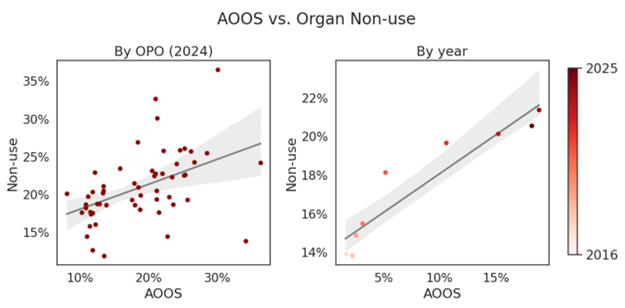Staying compliant: What you need to know about AOOS
Published on: Monday, August 11, 2025
The Organ Procurement and Transplantation Network (OPTN), under the direction of HRSA, is strengthening oversight of organ Allocations Out of Sequence (AOOS) to ensure fairness, transparency, and optimal use of donated organs.
Here’s how your organization can stay compliant and support fair and transparent organ allocation:
Understand What AOOS Means
- Operational Definition: AOOS occurs when an organ is offered, accepted, and/or transplanted in a way that deviates from the match run and is not consistent with OPTN policy.
- Analytical Assessment: AOOS is identified using specific bypass codes (e.g., 861, 862, 863, 887, 799).
Key Compliance Actions
- Follow the Match Run
Organ Procurement Organizations (OPOs) must allocate organs in the order of the match run unless an approved variance applies.
- Do Not Use Unapproved Expedited Placement Variances
No current variances are approved for expedited placement. You can reference OPTN Policy 5.4 (Organ Offers) for detailed information on organ offer requirements.
- Know Your Role
Only transplant programs, not OPOs, are authorized to transplant organs into recipients other than the accepting candidate under the “wastage” provision (OPTN Final Rule §121.7(f)).
- Use Bypass Codes Appropriately
Ensure that bypass codes are used accurately and only when justified. Where required, provide clear and complete justification of code usage.
- Review and Adjust Practices
All OPOs and all OPO teams (including but not limited to clinical, allocation, quality, teams etc.) should regularly review their data and allocation practices and make necessary changes to align with OPTN policy.
- Stay Informed
Regularly consult the OPTN Policies, OPTN policy notices, and AOOS resources to stay updated on definitions, compliance expectations, and monitoring tools.
Why it matters
The OPTN creates, implements, and monitors organ allocation policy. Despite claims that allocating outside of the OPTN-defined match run can help reduce organ non-use, the evidence does not support this assumption. In fact, as AOOS rates have increased in recent years, organ non-use has also increased. In addition, OPOs with higher rates of AOOS also tend to have higher rates of organ non-use.

AOOS undermines fair access—a core principle of organ allocation. The Membership and Professional Standards Committee (MPSC) is prioritizing patterns of noncompliance and will take further action if AOOS volumes remain high.



